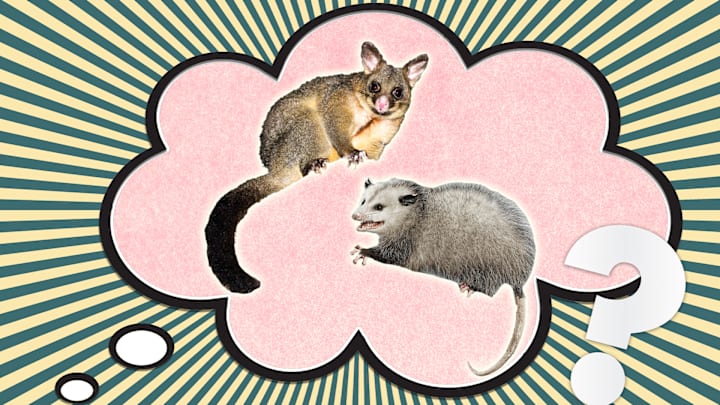In the mid-17th century, a creature of curious proportions was caught in Virginia and brought to the Royal Society in London for observation. The furry animal had a pointed snout, sharp teeth, and, most remarkably, a pouch in its belly. Unsure how else to describe it, those who saw it described it a cross between a fox and an ape.
This bizarre animal turned out to be the only marsupial native to the United States and Canada. Now, we know them as opossums—derived from the Algonquian word aposoum, meaning “white dog” or “white beast." (Despite the vicious-sounding nomenclature, opossums are rarely dangerous. They’re actually a boon to gardeners because they eat pests like beetles, slugs, and ticks.)
Opossum or Possum?

So where do possums fit into this narrative? You may occasionally refer to the pink-nosed animal trotting along the road as a possum, which is an acceptable truncated version of opossum. However, the word without the o refers to something very different outside of North America.
While possum is sometimes a synonym of opossum, it can also refer to a completely different species that lives in New Guinea, Australia, Indonesia, and elsewhere in the Pacific. Though possums and opossums have a lot in common—including the fact that they’re nocturnal, omnivorous, tree-dwelling marsupials that are known to play dead, or “play possum,” when threatened—they look quite different. (The image above shows what a common brushtail possum looks like.)
As for the pronunciation, it’s a common misconception that the first o in opossum is silent. Merriam-Webster, Grammarly, and Dictionary.com all note that the word is pronounced uh-possum, with the first vowel voiced. However, if you’re opting for the shortened version, possum, then it’s fine to omit the o sound. Unless you’re speaking with an Australian, it’s likely you’ll be understood either way.
Have you got a Big Question you'd like us to answer? If so, let us know by emailing us at bigquestions@mentalfloss.com.
